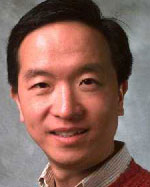Distributed Algorithms for Networked Embedded Sensing Systems

Speaker: Feng Zhao, Palo Alto Research Center (formerly Xerox PARC)
Date: Wednesday, November 13, 2002
Time: 2:00-3:00pm
Location: AP&M 4301, UCSD (directions and parking information)
Host: Andrew Chien, achien@ucsd.edu
Presented by: UC San Diego, Computer Science & Engineering, co-sponsorship by Calit²
Live Webcast: http://webby.ucsd.edu/ramgen/current.smi (available at 2pm on 11/13/02)
Archived Webcasts available at: http://www.calit2.net/multimedia/archive.html
Abstract:
Networked embedded systems are becoming increasingly available for commercial and security applications thanks to advances in MEMS, wireless, and embedded processing. From the computer science point of view, sensor and actuator networks become a rich source of problems in communication protocols, sensor tasking and control, distributed databases, probabilistic reasoning, and algorithmic design. In this talk, I will describe our recent work in distributed algorithms for networked sensing and applications. Object tracking is an essential capability for sensor networks in many practical applications, and has been used as a canonical problem to drive out the important issues in designing distributed algorithms. Traditional signal processing approaches have focused on optimizing estimation quality for a fixed set of resources. However, for power-limited and multi-user decentralized systems, it becomes critical to carefully select the embedded sensor nodes that participate in a collaborative processing task, balancing the information contribution of each agent against its resource consumption or potential utility for other users. We term this style of computation in distributed embedded systems as collaborative signal and information processing (CSIP). I will describe IDSQ, a family of distributed algorithms and protocols that optimize for information gathering and routing while satisfying a set of resource constraints. Experimental results from several PARC testbeds have demonstrated that IDSQ modularizes the computation and communication and is key to the scalability of large-scale networked embedded systems.
Biography:
Feng Zhao is a Principal Scientist and directs the Embedded Collaborative Computing Area in the Systems and Practices Laboratory at PARC (www.parc.com/ecca). He is also Consulting Associate Professor of Computer Science at Stanford. The two main projects in his group, Collaborative Sensing and Smart Matter Diagnostics, investigate how MEMS sensor and networking technology can change the way we build and interact with physical devices and environments. His research interest includes distributed algorithms for networked embedded systems, sensor data analysis, diagnostics, qualitative reasoning, and control of dynamical systems. Dr. Zhao received his PhD in Electrical Engineering and Computer Science from MIT in 1992, where he developed one of the first algorithms for fast N-body computation in three spatial dimensions and phase-space nonlinear control synthesis. From 1992 to 1999, he was Assistant and Associate Professor of Computer and Information Science at Ohio State University. His INSIGHT Group developed the SAL software tool for rapid prototyping of spatio-temporal data analysis applications; the tool is currently used by a number of other research groups.
Dr. Zhao received the ONR Young Investigator Award and the NSF Young Investigator Award, and was an Alfred P. Sloan Research Fellow in Computer Science. He serves on the editorial boards of IEEE Transaction on Control Systems Technology, AI Magazine, New Generation Computing, and guest co-edited an IEEE Signal Processing special issue on collaborative signal and information processing (CSIP) in microsensor networks. He chaired the first International Workshop on Information Processing in Sensor Networks and is a co-chair of the 2nd in the series (www.parc.com/ecca/ipsn03). He has authored or co-authored over 50 peer-reviewed technical papers in the areas of networked embedded systems, artificial intelligence, nonlinear control, and programming tools, and is a co-inventor of three US Patents and three pending patent applications.

